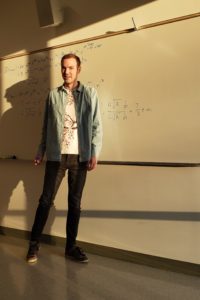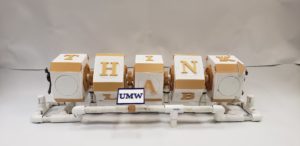William “Henry” Mills was in his late 20s when he arrived at UMW. After community college and a lackluster job, he’d begun to get serious about making the most of his life. This wasn’t the time, Mills thought, for playing it safe.

“I’d always been interested in physics,” he said. “I just never thought I was cool enough to study it.”
Oh, but he was.
For his work making movies of molecules in motion in a field called “ultrafast physics” – how cool is that? – he has received the Goldwater Scholarship, among the most prestigious undergraduate awards, with winners this year from Harvard, Johns Hopkins, Princeton and Brown. His research – a complex equation of quantum mechanics, high-level math and computer programming – explores the ways in which molecules rotate, shedding light on processes like vision and photosynthesis.
With guidance from his advisor, Assistant Professor Varun Makhija, and other faculty members in UMW’s recently merged departments of Chemistry and Physics, Mills’ research chronicles the movement of frenetic molecules by making movies of them using lasers.
“I didn’t realize until recently how much I love talking about what I do,” Mills, a junior physics and math double major who plans to pursue a Ph.D. and become a college professor, said in his Goldwater Scholarship application. “I find the experience of explaining the physics that people cannot see, which is often non-intuitive and fantastical, to be thrilling.”
He shows off his penchant for making his mind-boggling work understandable in a YouTube video, “Field-Free 2D Alignment of Molecules Using Femtosecond Laser Pulses,” which won second place for best presentation in UMW’s Summer Science Institute last year. And, with the scientists with whom he’s collaborating from Stanford and Stony Brook universities, and the National Research Council of Canada, Mills co-wrote “Strong Field Molecular Ionization of Water,” published this spring in the journal Physical Review A.
He helped explain experiments by the Stanford and Stony Brook groups, which created a state of ionization in which molecules align and stay still for their close-ups, but not for long. A laser light flash that is faster – much faster – than the blink of an eye is needed to capture the images. “It turns out that the burst needs to be at most a millionth, of a millionth, of a hundredth of a second long,” said Makhija, who added that Mills helped build a laser at UMW’s Jepson Science Center to carry out similar experiments.
The work is elusive, relying on possibilities and percentages, but Mills and his team have nailed down a formula for catching the photos they need. “We at UMW are probably one of four or five groups in the world who are doing these calculations,” he said.
Earlier projects – think potato cannons and the tricking out of an old-fashioned X-Box – have morphed into some serious scholarship for Mills, who’s vice president of UMW’s chapter of the Society of Physics Students. He also works in the Think Lab, where he uses 3-D printers and laser cutters to create his own intricate projects and help fellow students with theirs. Plus, he’s a physics tutor.
“It’s one of the things I learned at Mary Washington,” he said. “The faculty’s blend between doing their own research and doing research with students, and getting them excited about it, is awesome.”

Among the nation’s most prestigious collegiate awards, the Goldwater Scholarship was created in honor of late U.S. Sen. Barry Goldwater, who had an interest in science and technology. About 400 scholarships – which come with monetary awards of as much as $7,500 each – were bestowed this year on students who wish to pursue careers in math, science, engineering or medical research.
“Henry is a passionate, curious and mature scholar,” said Kelli Slunt, who along with fellow Professor of Chemistry Leanna Giancarlo, shepherded him through the application process. “His ability to adapt his research and desire to inform others about physics, especially this year in a virtual environment, are exemplary.”
After participating in a summer program at the Newport News Jefferson Lab, home to Virginia’s only particle accelerator, Mills will continue his current research, begin work on a project with UVA and start applying to grad school.
Pretty cool, huh?

